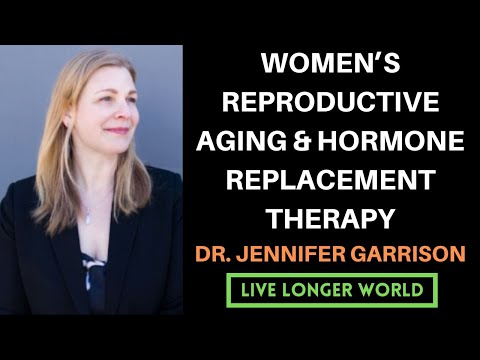I somehow knew about Choline from way back. Always supplemented with lecithin in my pregnancies. Of course this is what I meant, as I am stopping all my longevity supplements / interventions but wondering what else is good but little known to take during pregnancy? The equivalent of choline that I haven’t heard of?
Any other women experience any rapamycin issues / side effects like this person has? My Rapamycin Symptoms (female)
I can’t even imagine what it must feel like for my ovaries to be palpable, even the way she describes it. I’ve taken some high dosage in my day, nothing of the sort.
My guest today is Dr. Jennifer Garrison. She is a an Assistant professor at the Buck Institute for research on aging where she runs her own lab and studies women’s reproductive aging. In today’s conversation we discussed:
- Menopause and it’s effect on women’s health
- Hormone replacement therapy and its benefits
- How increasing the number of quality eggs a woman has at age 40 by just 1% can be a game changer
- The role of the brain in female reproductive aging
- Genetics and ovarian aging
Another user report on rapamycin for menopause here:
Here’s where it gets really interesting again! My partner dipped into menopause and then rocketed back out!
See full post here: My DOG, My PARTNER, and ME: A Week by Week Rapalogue - #85 by HigoMe33
I am still touching base with the researcher who has done (is doing) this research (mentioned below) on rapamycin and ovarian function in mice. The paper has not yet been published. Here is his most recent update from today:
Yes, the manuscript is still in preparation after repeated experiments. We are taking some time to replicate experimental conditions to see if the effects we hope to see persist.
Rest assured I will share our work…as much as I would want to when we submit.
Kind Regards,
=====================
This is the information that prompted me to search out the contact info for the researcher, and see if I could get more information:
Okay so the clinical trial dose is 5mg a week for 12 weeks, I assume they are titrating up to that the first week or two. Do we know if they are on birth control until the 12 weeks ends? Is there an amount of time between stopping Rapamycin before becoming pregnant? Does anyone know any further details here??
Did you and your partner decided to start rapamycin for fertility?
Neither of us. We were trying but no success - the main reason we were declined for ART was AMH level. was only curious because if increased AMH was due to the improvement of follicle recruitment & growth it’d make sense that the environment (and egg quality) in effect improves or is in some way restored. Since the effect seems to be slowing down eggs being released, that doesn’t imply the improvements that follicle recruitment process optimization would have but I don’t know. Not really personally relevant at this point, that ship has sailed. Just curious. Interest is anti-aging.
A friend of mine (35, Hashimoto’s) wants to freeze her eggs for later pregnancies. After stimulation, she had only 3 follicles, which where large enough for becoming eggs.
Her general reserve is minimal to begin with. Additionally, freezing, unfreezing, fertilizing and implanting causes loss.
Do you have any suggestions?
It’s a friend and I don’t want to suggest anything, that could harm her. On the other hand, my best guess would be one or two of the list: Rapamycin, Metformin, Ca-AKG, Inositol.
Couple suggestions that are mainstream include the supplement plans from “it starts with the egg” 3rd edition and the book suggestions for low amh, age, and autoimmune factors. The supplement plan includes inositol (I assume she is not PCOS if her AFC is 3 after stims)
With hashimotos many women choose to give LDN a shot based on inflammation affecting follicle recruitment (especially if also trying naturally/IUI) and apparent reduced implantation failure. If she isn’t on an anti-inflammatory diet already that’s another reasonable suggestion along with reducing toxin exposure.
There are some fertility clinics that use a “kitchen sink” approach with autoimmune/implantation factors recommend strict keto or carnivore diet. At 35, if it were me, I would to try and reduce inflammation and increase egg quality without getting too far outside of what has been reasonably researched in humans with a low risk of adverse effect.
She is still young so has time to bank eggs - egg quality over quantity. It only takes one quality egg.
Interesting news… I’ve reported in the past that I fed my chickens rapamycin for several years and it seemed to maintain their egg laying ability at youthful levels. Rapamycin is in many ways considered to mimic the effects of caloric restriction… so this would seem to make sense.
Prolonged severe caloric restriction in hens restores their egg-laying capacity, slows aging and increases survival.
Congratulations.
That is awesome. It’s actually what I am hoping for. Would you mind telling us what you were taking?
During pregnancy I would advise adding additional B vitamins, Iron, and Multi mineral (calcium, magnesium and zinc). I took all of those during my last full term successful pregnancy.
Thank you for this information. I was taking it 2-3 mg a day for 2-3 days at the beginning of my cycle. I may have to try that method to see if I get any results. I hadn’t taken it for a few months because I was running out and getting mouth sores.
I was just listening to this interview with Longevity researcher Colleen Murphy at Princeton U., and she mentions some research she’s done on mitochondrial health as it relates to egg (oocyte) and fertility health. They’ve found (as have other labs) that the supplement Urolithin A seems to really help with egg quality, by boosting the mitochondrial health in the eggs.
If you’re interested in this topic, I recommend you listen to the podcast - queued up for this specific part of the discussion. Research below on this topic also (below the video):
Research on Urolithin A and oocyte Health
The research that Colleen Murphy’s lab did on this topic:
Related Reading:
Here: Urolithin A (UA) One of 4 Promising Agents 2024 by Brian Kennedy of NSU
Hi all, new here and just read through this entire thread. Apologies if some of these questions have been discussed before.
I’m 33F and have recently found out that my fertility markers (AMH = 0.24ng/mL, AFC = 4) indicate diminished ovarian reserve. I’m now researching options to preserve what remaining fertility I do have.
It seems that mice model studies show that Rapa preserves ovarian reserve + improves egg quality. Amazing. I plan to start taking it now until I’m ready to TTC in a few years time.
However, I’m also considering pursuing egg freezing first, and wondering if I should wait to start Rapa until completing the egg retrieval cycles. The mouse studies showed that Rapa could impede follicular growth in the short term, but a human study showed women with endometriosis treated with Rapa for 3 months before undergoing IVF resulted in more eggs retrieved vs control.
Anyone have opinions or suggestions on how they might use (or not use) Rapa if they were pursuing egg retrieval?
Just a side-note to be aware of. Egg freezing is definitely an option, but some people think its a guaranteed pregnancy later, but the success goes down relatively quickly it seems:
Elective oocyte cryopreservation involves controlled ovarian stimulation with injection medication and ultrasound-guided egg retrieval. The retrieved eggs are then stored in the fertility clinic. The procedure is expensive, as total costs range from $9000 to $17,000 per cycle with an additional $300 to $500 annual storage fee.
However, freezing eggs does not guarantee future live birth. Research suggests that women under 35 with normal ovarian reserve have the highest chance of giving birth using frozen eggs.
An earlier study of 645 women who chose elective oocyte cryopreservation found that only 54 (8.4%) used their frozen eggs during the 18 years period. Among women who did, 17 (31.5%) achieved at least one live birth. The birth rates were the highest among women aged 35 and younger (63.6%), compared to those 36–39 years (42.3%) and women 40 years and older (17.6%).
Source: https://healthnews.com/news/most-women-do-not-use-their-frozen-eggs/
Thanks for the reply - I’m definitely aware of the low incidences of live births from frozen eggs. It’s a tricky decision because if you choose not to, and later face infertility, you’re always going to wonder if you should have pursued it. It’s an industry built on fear. But most women that do freeze eggs never use them because they end up conceiving naturally when they’re ready.
It does seem like Rapa is a promising alternative.
Another article that touches upon this thread’s discussions:
Here: A guide to extend longevity by delaying menopause (Age1)

